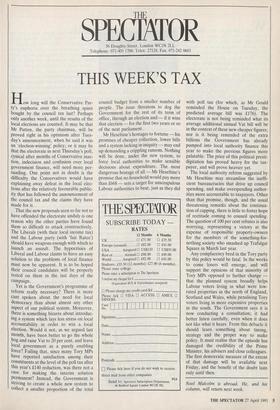SPECTAT NIF OR
56 Doughty Street, London WC1N 2LL Telephone: 071-405 1706; Telex: 27124; Fax: 071-242 0603
THIS WEEK'S TAX
How long will the Conservative Par- ty's euphoria over the breathing space bought by the council tax last? Perhaps only another week, until the results of the local elections are counted. It may be that Mr Patten, the party chairman, will be proved right in his optimism after Tues- day's announcement, when he said it was an 'election-winning' policy; or it may be that the electorate in next Thursday's poll, cynical after months of Conservative inac- tion, indecision and confusion over local government finance, will need more per- suading. One point not in doubt is the difficulty the Conservatives would have explaining away defeat in the local elec- tions after the relatively favourable public- ity that has followed the announcement of the council tax and the claims they have made for it.
That the new proposals seen so far not to have offended the electorate unduly is one reason why the other parties have found them so difficult to attack constructively. The Liberals (with their local income tax) and the Labour party (with 'fair Rates') should have weapons enough with which to launch an assault. The hypocrisies of Liberal and Labour claims to have an easy solution to the problems of local finance must now be apparent. It is to be hoped their council candidates will be properly tested on them in the last days of the campaign.
Yet is the Government's programme of reform really necessary? There is more cant spoken about the need for local democracy than about almost any other aspect of our political system. Moreover, there is something bizarre about introduc- ing a system which lays less stress on local accountability in order to win a local election. Would it not, as we argued last month, have been better to go the whole hog and raise Vat to 20 per cent, and leave local government as a purely enabling force? Failing that, since many Tory MPs have reported satisfaction among their constituents at the level of the poll tax after this year's £140 reduction, was there not a case for making the interim solution permanent? Instead, the Government is striving to create a whole new system to collect a smaller proportion of the total council budget from a smaller number of people. The issue threatens to dog the Government for the rest of its term of office, through an election and — if it wins that election — for the first two years or so of the next parliament. Mr Heseltine's hostages to fortune — his promises of cheaper collection, lower bills and a system lacking in iniquity — may end up demanding a crippling ransom. Nothing will be done, under the new system, to force local authorities to make sensible decisions about expenditure. The most dangerous hostage of all — Mr Heseltine's promise that no household would pay more than £668 — sets a target for unscrupulous Labour authorities to beat, just as they did with poll tax (for which, as Mr Gould reminded the House on Tuesday, the predicted average bill was £176). The electorate is not being reminded what its average additional annual Vat bill will be in the context of these new cheaper figures; nor is it being reminded of the extra billions the Government has already pumped into local authority finance this year to make the previous figures more palatable. The price of this political presti- digitation has proved heavy for the tax- payer, and will prove heavier yet.
The local authority reform suggested by Mr Heseltine may streamline the ineffi- cient bureaucracies that drive up council spending, and make overspending author- ities more accountable to taxpayers. Other than that promise, though, and the usual threatening remarks about the continua- tion of capping, there is little to foster hope of rectitude coming to council spending. The question of 100 per cent rebates is also worrying, representing a victory at the expense of responsible property-owners for the members of the something-for- nothing society who smashed up Trafalgar Square in March last year.
Any complacency bred in the Tory party by this policy would be fatal. In the weeks to come losers will emerge, and will support the opinions of that minority of Tory MPs opposed to further change that the planned system broadly helps Labour voters living in what were low- rated properties in the north of England, Scotland and Wales, while penalising Tory voters living in more expensive properties in the south. The Government says it is now conducting a consultation; it had better listen carefully, even when it does not like what it hears. From this debacle it should learn something about timing, strategy and the proper way to make policy. It must realise that the episode has damaged the credibility of the Prime Minister, his advisers and close colleagues. The first democratic measure of the extent of that damage will be available next Friday, and the benefit of the doubt lasts only until then.


















































 Previous page
Previous page